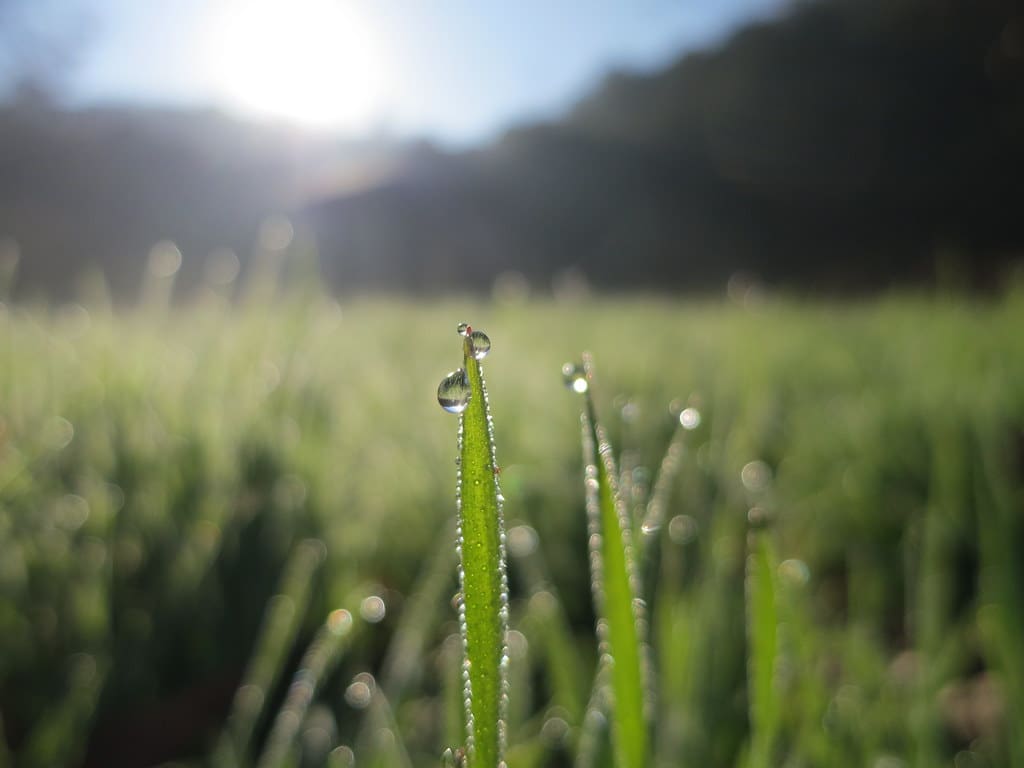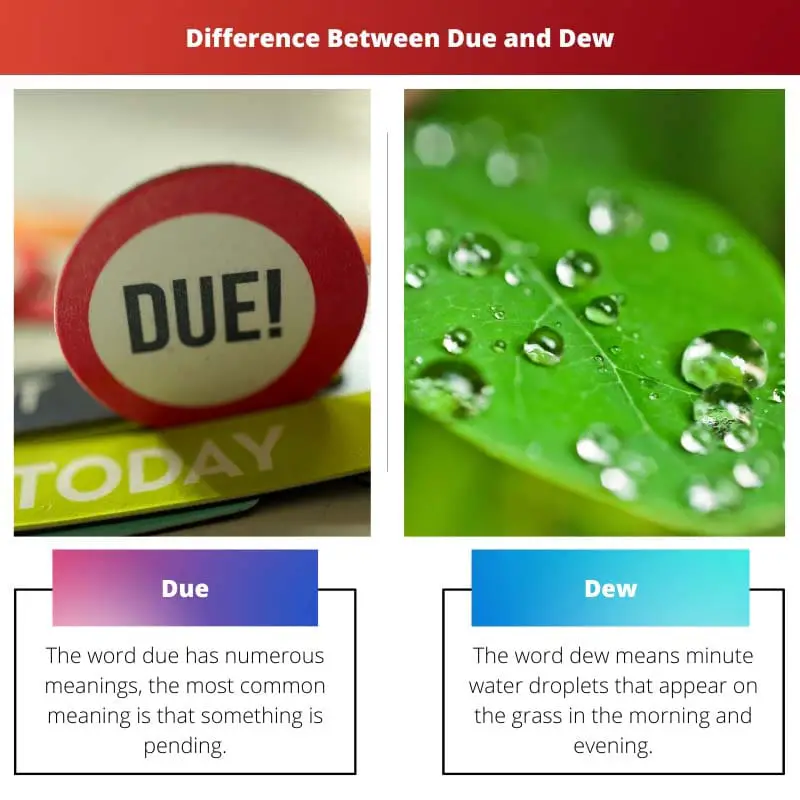A homophone is a very intriguing and confusing topic of the English language. So, homophones are words that have the same sound but have different meanings and usage.
The words due and dew are homophones and cannot be employed interchangeably. If they are used interchangeably, the entire meaning of the sentence is modified, and a blunder occurs.
Key Takeaways
- Due is an adjective that means something is owed or scheduled to happen, while the dew is a noun that refers to the moisture that forms on surfaces during the night.
- Due is used to describe a debt or obligation, while dew describes water droplets.
- Due is used in financial or legal contexts, while the dew is used in meteorological contexts.
Due vs Dew
Due means expected or owed, or refers to a time when something is supposed to happen, such as a due date for an assignment or a payment that is due. Dew refers to small drops of water that form on surfaces, like grass, during the night when the temperature drops and moisture in the air condenses.

The word due is from the old French word in 14 C. It has different meanings. The first interpretation is that something is on the verge of happening.
The second interpretation is that someone accepts something. The third meaning is because of something.
The other meaning in terms of adverbs is that something is happening exactly. We use the word due according to its requirement in a sentence.
Dew is a proto-Germanic word that refers to very minute water droplets. Dew happens due to the condensation process (conversion of water vapors into liquid).
The word dew, which denotes the figure of resurrection, is even mentioned in the Bible. The word dew is a noun in the English language.
Comparison Table
| Parameters of Comparison | Due | Dew |
|---|---|---|
| Definition | The word due has numerous meanings, the most common meaning is that something is pending. | The word dew means minute water droplets that appear on the grass in the morning and evening. |
| Parts of Speech | The word due is a noun, an adjective, and an adverb. | The word dew is a noun. |
| Roots | The word due is taken from the old French word. | The word dew is a proto German word. |
| Synonym | The synonyms are awaited and anticipated. | The synonyms of the word dew are mist and moisture. |
| Example | My assignment is due. | I saw dew in the morning. |
What is Due?
The English word due has been a part of the English language since the 14th C. This word is from an old French language.
The term due has a variety of meanings depending on how it is used in conversation and while writing.
Due belongs to the three types of speech (noun, adjective, and adverb). When due appears to be a noun in a sentence, the first meaning is fee or charges.
The other meaning is the thing that is somebody’s right.
For Example
- Please pay your dues.
- He received this property as per his due.
So, the first sentence is related to paying a fee, and the second sentence depicts somebody’s right.
When the word due acts as an adjective, its first meaning is to deserve something. The other meaning is that something is pending at a given time.
For Example,
- His hike in salary is due.
- Your assignment on the latest topic is due.
In both sentences, the word due has different meanings but, it acts as an adjective.
When the word due is an adverb, the meaning is exactly.
To Exemplify,
- He is due towards the park.
- Move due parallel to the footpath.
In both sentences, the word due is used as an adverb (an adjective that defines the verb).

What is Dew?
The word dew is also an English word that is a homophone of the word due. It means water in terms of droplets.
Dew is created during the condensation process, which occurs after evaporation.
In the morning and evening, it is found on the windows of automobiles, the tips of grass, and plants. The other name of the word dew is mist and moisture.
It is formed when the surface cools down by releasing its heat, and at that time, moisture condenses (changes its state from gas to liquid), and tiny water droplets appear on the surface.
If the temperature is low, the dew takes the shape of frost (frozen water droplets).
As a result, we can conclude that temperature plays a vital role in dew production. The dew point is the temperature at which dew develops.
The origins of the word dew can be traced back to Greek mythology. The word dew was known after the goddess of dawn wept over her son’s death.
Dew is even read in the Bible. According to the Bible, dews on the plants means resurrection (coming back after the demise).
This connotation is associated with water, which first becomes vapors, and then some of the vapors convert into liquid in the form of droplets. It happens due to moisture in the air.

Main Differences Between Due and Dew
- The word due is used in many contexts as per the requirement. On the other hand, the meaning of the word dew is the tiny water droplets.
- The word due can be categorized as a noun, an adjective, or an adverb as per usage. On the contrary, dew is a noun.
- The word due has its root in the French word. On the other side, dew is a proto German word that appears in the Bible.
- The word due ends with the vowel E. However, the word dew ends with the letter W.
- The word due is a synonym of awaited and anticipated, and dew is a synonym of mist and moisture.





